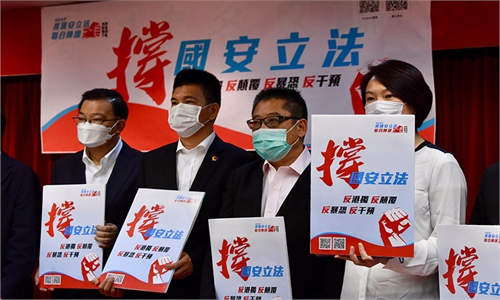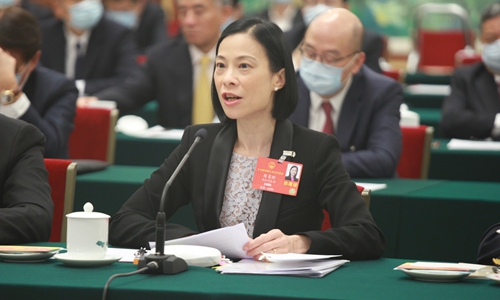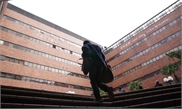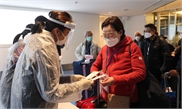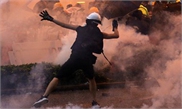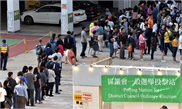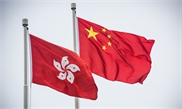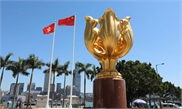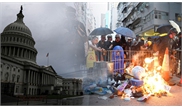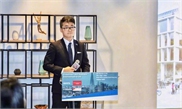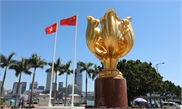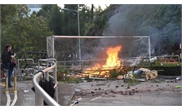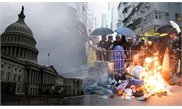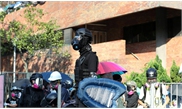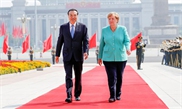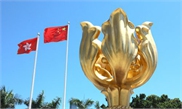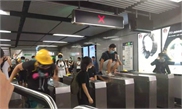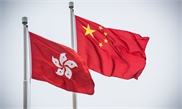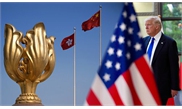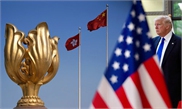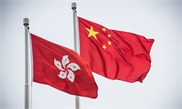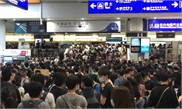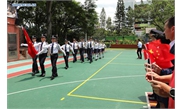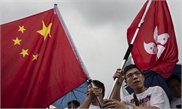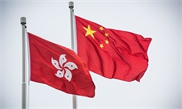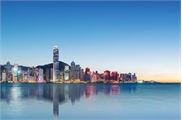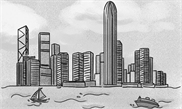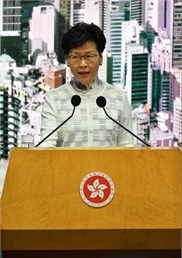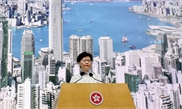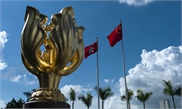National security law to end Hong Kong chaos soon: Global Times editorial
Beijing has made it crystal clear that the law targets only very few criminals, not the wider public. It has stressed that the more solid it holds the security bottom line, the more room the “one country, two systems” principle will have.
HK's foreign judges should be barred from national security trials: NPC deputy
"Potential or actual conflict of interests may occur if a foreign judge or a judge with dual nationality is involved in national security cases,” said Maggie Chan Man-ki, who is currently in Beijing to attend the annual two sessions.
HK politicians to propose correcting anti-mainland education at national two sessions
An inappropriate question in the Hong Kong special administrative region's college entrance exam regarding China's modern history has been met with a backlash from both the authorities and society, calling into question the city's long-term flawed national education and inviting proposals from officials for change.
Lack of trust and political fault-finding impede HK govt's viral fight: analyst
Despite strict and timely government measures to curb the spread of the virus, people in Hong Kong have not been as vigilant as those in the mainland have been。
Rare trip to US by HK pro-establishment figures helps present true story of HK: analysts
The visit, financed by the US Department of State, was the first since US President Donald Trump signed into law the “Hong Kong Human Rights and Democracy Act” in November, a period marked by anti-government violent protests in Hong Kong.
Greater connection to the mainland would safeguard HK stability
If China can take the initiative in its competition with the US, it would build confidence among Hongkongers and inspire them to love the country while making the mainland more attractive from their perspective.
Hong Kong needs to introspect its future
No Hongkonger should be absent in the great discussion about the city's future. How Hong Kong can better integrate within the country is a topic more valuable than the “public opinion” trend in a specific election.
Time for HK pan-democrats to build consensus
Pan-democrats gained more seats, but they should maintain political sobriety. The young newly elected, in particular, should keep a distance from those who betray the country and Hong Kong, and have the courage to explore a new political path in accordance with the “one country, two systems” principle. Hong Kong is a part of China, and never will it belong to the US or the West. Only by keeping this in mind and acting accordingly will they have a solid political career.
Attempt to contain China is the real intention of Hong Kong bill
The HKSAR government should use all necessary measures to stop the violence, restore stability in the city, and punish the radical separatists and activists who would not hesitate to be traitors just for personal gain.
American elites expose ulterior motives on China
As the unrest escalates in Hong Kong, they have completely removed their academic veneer and showed their true anti-China intentions. We have become clearer about what they are really up to. But as it had happened several times in the past, their evil intentions will eventually collapse amid China's steady pace forward.
HK district council elections result needs rational analysis
The country will never abandon Hong Kong, and will never ignore the people and forces who love the motherland and the city. Hong Kong's problems need objective analysis and practical solutions. The country will always provide guarantees for Hong Kong.
How Western media paints a prostitution solicitor as a political victim
Western public opinion is telling a monstrous lie to the world against China. China is leading its people toward modernization but is portrayed as a dark country frequently violating human rights. People-centric China is promoting practical resolution of multiple issues and has achieved fruitful outcomes, but is criticized for “autocracy.” The current age is the most absurd one for Western public opinion.
Call it 'Support HK Violence Act'
Hong Kong's future is bound to that of the entire China, instead of the US.
Why Hong Kong middle class fails to see the sinister designs of radical protesters
The future of Hong Kong is in the hands of the middle-class, more of whom should make choices wisely and fulfill their obligations to society.
US steps up interventionism with Hong Kong bill
China must play the role of safeguarding national stakes and multilateral development interests under globalization, resolutely striking back at acts of US interventionism and promoting a new international economic and political order that is fair and equitable.
HK high court usurped its authority
Washington should not overestimate its cards to intervene in Hong Kong affairs. When it comes to cardinal issues of right and wrong, when Hong Kong faces historic choices, what the US has in its hand means nothing.
HK won't top Merkel's China trip agenda
We believe that when Merkel raised the Hong Kong affairs in Beijing, she was perfunctory. Hong Kong will never top the agenda of her trip. Merkel's words on Hong Kong will not affect exchanges between China and Germany.
Can an emergency be proclaimed in Hong Kong?
We believe that the discussion on whether to use the Emergency Regulations Ordinance is a right step for the Hong Kong community to combat violence. Hong Kong has many more available legal resources, and activating and mobilizing them will not only have an effect, but also help maintain the consistent logic of Hong Kong's existing legal system, and make the anti-riot measures strictly follow the rule of law.
MTR should avoid kowtowing to HK radical forces
Without a stable and prosperous Hong Kong, where is the future of the MTR and the Hong Kong people? The management of the MTR should not lose its way. It's time for the MTR to take a firm stand. It should do its part so that Hong Kong does not lose its tomorrow.
US can't influence Beijing's decision on HK
If Washington wants to link trade talks with Hong Kong under such circumstances, it so flatters itself.
HK unrest part of US attempt to spread its own brand of democracy
It is hoped that young Hongkongers can stop focusing on US rhetoric that aims to mislead the public, but inject more energy in the city's economic development and livelihood.
Futile for Washington to play HK card
The incident in Hong Kong won't be a repeat of the June 4th political incident in 1989. Washington will not be able to intimidate China by using the turmoil 30 years ago. China is much stronger and more mature, and its ability to manage complex situations has been greatly enhanced.
HK's future lies with China, not with the West
Only by ending the riots can Hong Kong get back to normal. The breeze blowing toward Hong Kong in the future must come from the mainland, not from the West.
Wise companies in Hong Kong ought to draw a clear line against violent protests
A group of violent protesters in Hong Kong organized a series of illegal rallies and violent protests that have had devastating effects on the local economy and people's well-being.
Beijing won't abandon HK economy despite US threats
At a sensitive moment during the US-launched trade war, which has already wreaked havoc on the world economy, it's extremely dangerous to make Hong Kong a part of the China-US row and complicate the situation further.
Color revolution aims to ruin HK's future
The Chinese government will never allow extreme opposition and the West to pull Hong Kong into the anti-China camp, nor will it allow the city to slip into long-term chaos or become a base for the West to subvert China's political system. This is a grim fight between attempts to deprive and defend the city's international financial center status.
Hong Kong must make a choice: stability or turmoil?
Hong Kong will have to choose. If it provides opportunities for terrorism, Hong Kong will be engulfed in turmoil and most Hongkongers will lose their stable life. But if Hong Kong chooses stability, then it should not give any chance for terrorism and should firmly crack down on terrorist activities. A middle course does not exist.
Hong Kong youth should rechannel anger
The Hong Kong government should meanwhile recognize its youth policies have been inadequate. The government should continue to provide more support to help young people find jobs and provide them with more affordable housing. If Hong Kong's youth are willing to broaden their perspective with the help of policy initiatives, it's only a matter of time before they can break out of their current predicament.
Cathay Pacific must face up to safety issues
If Cathay Pacific continues sacrificing aviation safety and high-quality services for political passion within the company, it then chooses to undertake the price of great losses on the mainland market.
China has big plans for its Greater Bay Area
The Chinese government plans to transform the Guangdong-Hong Kong-Macao Greater Bay Area (GBA) into an economic powerhouse that will drive innovation and GDP growth in the region. Taking its inspiration from Japan's Tokyo Greater Bay Area, the San Francisco Bay Area and the New York metropolitan area in the US, the initiative aims to improve connectivity and cooperation between nine key cities in South China's Guangdong Province, Hong Kong and Macao.
Hong Kong won't succumb to radical protesters
The radicals are nothing but cowards trapped by utopian illusions. Only can relentless law enforcement wake them up so they will realize that Hong Kong has never abandoned the rule of law or the force to defend it.
Hong Kong youth's future hinges on mainland
It's hoped they will be able to broaden their vision, see things in the true light and work with the country's help and guidance to Hong Kong.
Should Beijing intervene forcefully in Hong Kong?
Would you like Beijing to be forceful, such as ordering the Hong Kong Garrison of the Chinese People's Liberation Army (PLA) to take to the streets to maintain order? Personally, I am against this idea.
Hong Kong opposition's pipe dream of amnesty to the mob
Hong Kong's opposition and radical protesters have ridiculed themselves by demanding that the Hong Kong Special Administrative Region (HKSAR) government not prosecute lawbreaking demonstrators. We believe that the SAR government will never make concessions to them on the issue.
Hong Kong rioters can't get away with their acts
The rioters should stop as soon as they can. They won't have a way out by antagonizing Hong Kong laws and the Basic Law. The central government and Chinese people will resolutely make sure this principle.
Violent protestors damage Hong Kong, their own futures
The future of Hong Kong is in the hands of young Hongkongers. As the economic advantages of Hong Kong are declining, young Hongkongers should more rationally think about how to make full use of the huge mainland market to pull Hong Kong out of its dilemma.
Hong Kong's 'silent majority' won't stay silent forever
If Hong Kong loses its rule of law and becomes a political battleground, it will have an uncertain future. That is against the wishes of Hong Kong residents, and China will not allow it to happen.
Don't let external forces ruin Hong Kong's future
It is necessary to prevent the collusion between the extreme opposition and Western forces such as the US from becoming an ulcer of Hong Kong politics, which will put the future of Hong Kong in serious jeopardy.
Hong Kong's prosperity can counter US meddling
There are varied understandings of Hong Kong's prosperity, and even local residents have hugely diverging views on it. From the standpoint of public policy, Hong Kong, a special international financial hub and free port under the sovereignty of China, essentially relates its prosperity to a collective consensus of the city's stakeholders – Hong Kong residents, investors from outside the city, the Chinese mainland, and its international society.
Rule of law is Hong Kong's core value
Safeguarding the rule of law is the Hong Kong society's common value. External forces must respect this core interest of Hong Kong society and stop supporting violent protests. Otherwise, they are against all Chinese people.
Hong Kong an internal not international issue
The West often exaggerates or fabricates stories to deliberately make China's internal affairs international. By doing so, it wants nothing but to make trouble for China and benefit from that at the same time.
Hong Kong's economic potential to be further tapped
The huge market and economic opportunities brought about by the rapid growth of the economy of the Chinese mainland are the strong support that Hong Kong needs for its further economic development. Hong Kong must also take up the role of a bridge that connects China and the world.
US using Hong Kong unrest as bargaining chip
Not only the HKSAR government but also elites in Hong Kong should be vigilant and work jointly to restrain such a tendency. They must be aware that the rational nature of their society is changing.
US must think twice before playing Hong Kong card
The riot in Hong Kong is taking place amid the escalating China-US trade war. This made certain Americans and people in Hong Kong excited, believing their opportunity had arrived.
US hand apparent in Hong Kong unrest
The orchestration of the anti-bill campaign was no less than instigating fear.
Only the callous cheer disorder in Hong Kong
We ask that the living space of Hong Kong people is not destroyed.
Greater Bay Area will lead Hong Kong's youth to prosperity
Hong Kong's young people, if you work as hard as your predecessors, your glorious expectations for the future are not illusory, but will fall on the land of the Greater Bay Area.
Mainland cares more about Hong Kong than outsiders do
It should be noted that the tempo of political confrontation in Western societies changes with the rhythm of elections. But in non-Western societies, political confrontation often goes to extremes and hits a dead-end, affecting social governance mechanisms and even leading to tragedies. Hong Kong must not learn from them.
Hong Kong's future won't be held hostage by opposition and its Western supporters
The amendment aims to avoid Hong Kong becoming “heaven for criminals.” However, the legislation was politically hyped up by the opposition and their international supporters.
